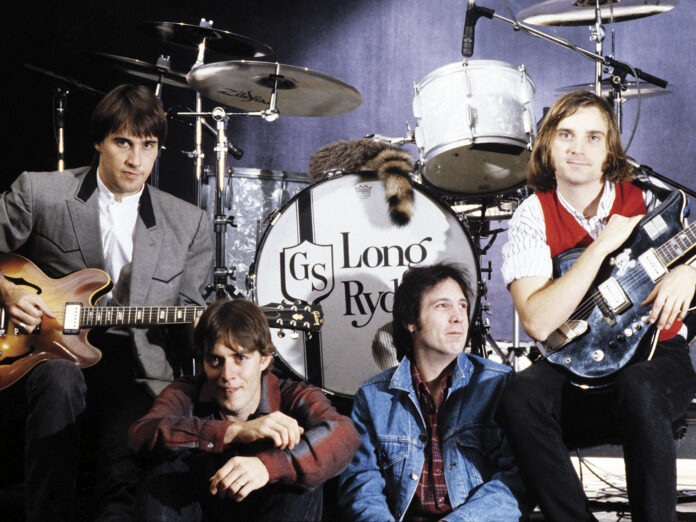NEIL YOUNG IS ON THE COVER OF THE NEW UNCUT – HAVE A COPY SENT STRAIGHT TO YOUR HOME
There’s nothing quite like pulling off a coup with your group’s first album, and with a guest appearance from The Byrds’ Gene Clark on Native Sons, The Long Ryders not only did just that, but they also made a pretty clear statement of intent: this is the music we love, these are the songwriters we love, let’s place ourselves in that lineage. The relationship between Clark and The Long Ryders was mutually supportive and beneficial, sharing bills, hanging out together, and thanks to producer Henry Lewy, a backing vocal on the Ryders’ “Ivory Tower”. “Gene Clark was kind to us, always,” Long Ryder Sid Griffin recalls, explaining what led to him calling Clark to ask him to share some of his wayward spirit on Native Sons. “The Long Ryders were told we sounded like The Byrds, so why not have a real Byrd sing on a track?”
Why not indeed. The Long Ryders were smelted in the same furnace as other groups doing the rounds in Los Angeles in the early ’80s – Green On Red, The Rain Parade, The Dream Syndicate, The Bangs (later The Bangles). Between them all, they’d be branded the Paisley Underground, a closely affiliated gang of musicians who embraced all that was good about the psychedelic ’60s – Love, The Doors, The Byrds, 13th Floor Elevators, etc – honing those sounds to a finely crafted setting of jewels and re-introducing the psychedelic aesthetic to underground rock. The Long Ryders were part of the scene, thanks both to the sound they chased, and simply by being based in Los Angeles, but out of all the Paisley Underground groups, they were the ones that crossed over most readily into other territory: roots rock, the not-yet-nascent ‘Americana’ movement, country rock.
It’s no surprise, then, to discover an artist as singular as Tom Petty was a supporter and huge fan of the group, for example. More curious are tales of U2 (who they almost toured with) and Noel Gallagher being big fans. But that’s the story with The Long Ryders – their influence is completely outsize to their level of success. This is not an uncommon story, but it’s curious to think of exactly music The Long Ryders are at the roots of, somehow: you can clearly hear their influence in groups like The Jayhawks and Uncle Tupelo, for example, and the Byrdsian glimmer of the C86 gangs, not to mention much of the music that now passes for Americana. And the foundational tablets for this influence are 1983’s “10-5-60” EP and the following year’s Native Sons, compiled, with a disc of demos and a storming live set from London’s Dingwalls in 1985, in this deluxe edition reissue.
Listening back to “10-5-60” and Native Sons, two things become clear: firstly, the Long Ryders are a group that benefit from lighter, more natural application of production mores; secondly, Stephen McCarthy is a sublime guitarist, someone who unerringly played exactly what the song needed, no more, no less. He was an articulate guitarist, but his proficiency never leaned towards showboating; the playing has no flash, but plenty of taste. It’s an assessment Griffin agrees with: “Stephen McCarthy was the Clarence White of his generation… Stephen shoulda been as famous as Johnny Marr!” One of the cumulative effects of listening to these three hours of early Long Ryders recordings is an ever-increasing awe at McCarthy’s fluency: it’s a perfect showcase for the ragged-yet-right spirit of his playing.
Of course, the songs are uniformly remarkable, too, particularly on the “10-5-60” EP, which might just outshine Native Sons for its flighty gruffness, the way it grabs hold of the moment – ‘this is our shot!’ – and essays six songs that are effortlessly cool in their updating and emboldening of Byrdsian folk-rock jangle. Native Sons introduces more country and roots elements to their songs, and Lewy’s production helps to highlight the melodicism at the core of the Long Ryders’ sound. (He was a wise choice, having produced Flying Burrito Brothers.) It’s the outliers that really shine here – the slow, mordant acoustic lament of “Fair Game”; the sky-bound, chiming mantra of “Too Close To The Light”. The demos shed light on the album’s development and offer a glimpse at some of the covers the group played: a convincing “Masters Of War”, and a gorgeous take on Tim Hardin’s “If I Were A Carpenter”. Forty years on, it still makes for thrilling rock music that moves the music forward by highlighting the art of its past.



